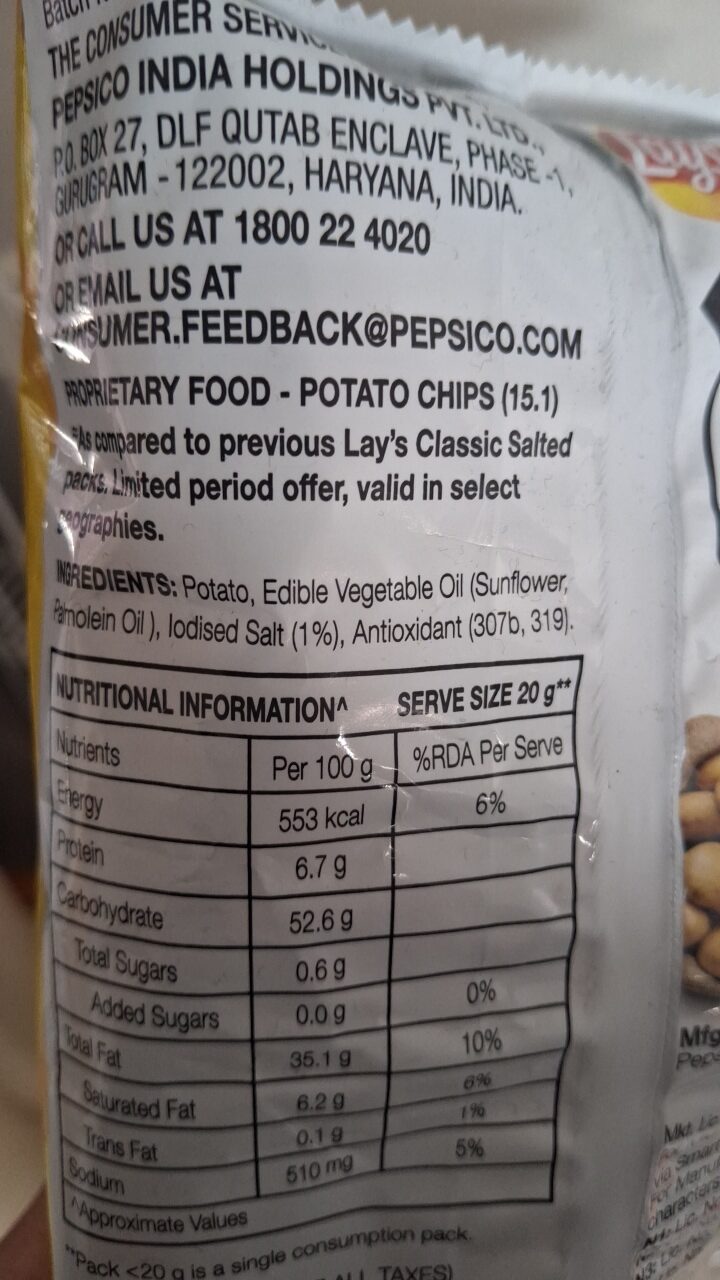
Barcode: 8901491101837
proprietary food – potato chips (15.1)
HALAL
📝 Reason: The product is considered Halal as it does not contain any Haram ingredients or E-Codes listed in the Haram_Ecodes_list. The antioxidant’s status is marked as Doubtful due to lack of specific information about its source. Islamic dietary laws permit consumption of plant-based ingredients and prohibit certain animal-derived substances and additives.
🏷️ Category: Chips, Snacks
📄 Certificates: Vegetarisch, Vegan
Ingredients:
Details
Are Proprietary Food Potato Chips Halal? Let’s Explore!
If you’re curious about the Halal status of Proprietary Food Potato Chips, you’re in the right place. This snack product has gained attention among health-conscious consumers and adherents of Islamic dietary laws. In this post, we will break down the ingredients, provide insights into their Halal status, and clarify any doubts regarding E-numbers or additives used in the product.
What Makes This Product Halal?
The Halal status of Proprietary Food Potato Chips is categorized as HALAL. This determination is based on a comprehensive examination of its ingredients and the absence of any Haram (forbidden) components. The primary inclusions are:
- Potato
- Edible vegetable oil
- Iodised salt
- Antioxidant
Ingredient Breakdown
Now, let’s dive deeper into each ingredient to assess their acceptability under Islamic dietary restrictions.
1. Potato
The first ingredient, potato, has no E-code and is considered naturally Halal according to general Islamic dietary guidelines. Potatoes are plant-based and completely permissible for consumption without any reservations.
2. Edible Vegetable Oil
This component also lacks an E-code and is derived from plants. It is marked as generally Halal unless it has been contaminated with non-Halal substances. The nature of vegetable oil ensures that it is compatible with Halal standards, making it a safe choice.
3. Iodised Salt
Like the other ingredients, iodised salt is mineral-based and falls under the Halal category. It is unprocessed and widely accepted in Islamic dietary frameworks. Thus, it does not pose any issues regarding Halal compliance.
4. Antioxidant
The antioxidant included in the chips has a doubtful status as the specific type is not mentioned. This ambiguity raises questions about its source. Since antioxidants can be derived from both plant and animal sources, the Halal or Haram status can vary greatly. Unless there is specific labeling indicating that this antioxidant is Halal, consumers may want to be cautious and seek further clarification.
Understanding E-Numbers
Interestingly, all the aforementioned ingredients do not have associated E-numbers that would typically be scrutinized for Halal compliance. E-numbers are codes for substances that are added to food products, and many of these can be derived from animal sources, which could make them Haram. The absence of E-numbers in this product simplifies matters, ensuring peace of mind for Halal consumers.
Certification Context
While proprietary food potato chips are Halal based on their ingredients, it’s essential to note that they are also categorized as Vegetarisch and Vegan. This is indicative of a broader commitment to health and dietary preferences, positioning the product as a wholesome option for a diverse audience.
Final Thoughts
In conclusion, Proprietary Food Potato Chips are largely considered Halal due to their plant-based ingredients. The only point of caution is the antioxidant, which requires further verification for a definitive Halal status. Always check product labels for Halal certification and transparency to ensure you are making the best choice. Enjoy your snacking experience with confidence!
